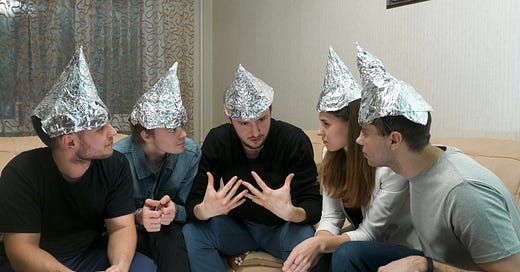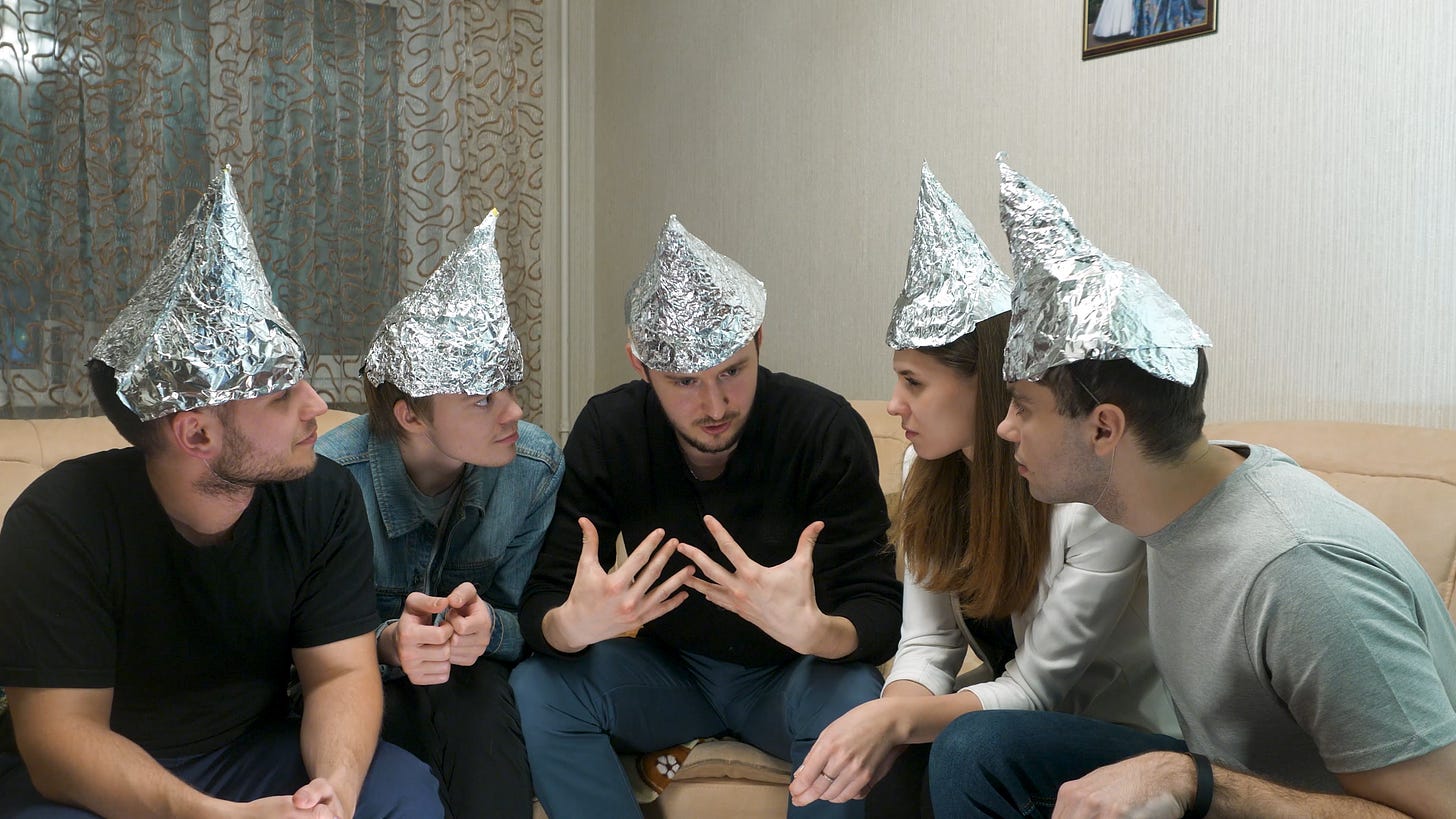How to Assess Conspiracy Theories Using the EPOE Protocol
This is a minor contribution to a major problem. But only the strongest minds can do this.
We need to normalize the words “CONSPIRACY THEORY”. It’s a tool used to dismiss conjecture, claims, charges, and admissions of conspiracies. There is no doubt that conspiracies happen. The trick is to try to determine whether individuals worked together to conspire to mislead the public on important issues. I end with proposed Categories of Conspiracy Theories to facilitate rational discourse on any proposed conspiracy.
Before we begin, I want you to think of something you would describe as a Conspiracy Theory or something that is considered by many to be a Conspiracy Theory. Go ahead. Put it in your head or write it down.
Got it? Now, proceed.
We’ll start with this:
A Conspiracy Theory is an idea or hypothesis that poses that two or more people were involved in the planning of specific events.
That seems innocuous enough.
Next, let’s consider a protocol that anyone can that applies logic, reason, and evidence to assess CTs. The protocol specifically avoids any consideration of consensus or authority.
Clearly define the conspiracy theory: One should start by articulating the conspiracy theory in a precise and concise manner. The central claims, actors involved, and any specific events or evidence associated with it should be made clear. Write it out, using a concept map if necessary.
Assess the plausibility of the theory:
Evaluate available evidence: Look for verifiable, factual evidence related to the theory. Consider physical evidence, documented records, eyewitness accounts, and any other observable information. The evidence can be positive (affirming) or negative (disproving). It’s actually best if you collect both.
Analyze the logical consistency of Each Piece of Evidence (EPOE): Evaluate the coherence and logical consistency of each piece of evidence (EPOE). Look for any internal contradictions or conflicts that may cast doubt on its credibility. In particular, the timing of events, and the classic “Means, motive, and opportunity” criteria for criminal investigations matter. That is not to imply that every conspiracy is a crime, but many are. If the actors allegedly involved had the ability, motive, and opportunity to conspire, the chances are much higher than if they lacked the means, had no motive, or did not have the opportunity to try to pull one off.
Analyze the logical consistency of the theory. After you’ve done the EPOE, do the same for the conspiracy theory’s claims in light of the evidence.
Occam's Razor: Consider the principle of Occam's Razor, which suggests that the simplest explanation is often the most plausible (parsimony). If a conspiracy theory relies on overly complex and too-convoluted explanations without strong evidence, it may be less credible. That does not mean that complex conspiracies do not happen (they do). But every step in the network of events should be subjected to rigorous scrutiny - attempts to DISPROVE work far better than attempts to PROVE.
Examine alternative explanations: This is important. Steel-manning is an exercise during which you make a genuine attempt to state, for the time being, without bias or opposing interpretation, an opposing viewpoint. This can be difficult for some people, sometimes, or some issues. Take the time to try to master this skill. Explore alternative explanations or competing theories that may account for the observed facts. Compare the credibility and plausibility of these alternatives with the conspiracy theory in question. Assess their logical consistency, supporting evidence, and potential biases. One cannot reject an opposing view if one cannot understand it.
Evaluate the credibility of the sources: While appeals to authority represent a logical fallacy, is it important to critically evaluate the sources associated with the conspiracy theory. Assess the credibility, expertise, and potential biases of the individuals or organizations presenting the information - including those denying the conspiracy. Have they conspired in the past? Have they misinformed repeatedly? Have they employed tactics known to be tools of disinformation? Keep in mind that this evaluation should be based on observable indicators, such as their track record, verifiability of their claims, and potential conflicts of interest.
Apply critical thinking and skepticism: Employ critical thinking skills and a healthy dose of skepticism throughout the evaluation process. Question assumptions, biases, and logical fallacies. Strive to maintain an open mind while rigorously assessing the available information.
Review and reassess: Periodically revisit the conspiracy theory and its evaluation, as new information or perspectives may emerge over time. Adjust your assessment accordingly based on your evolving understanding of the topic. Purifying ore into steel takes multiple rounds of grinding firing and purging.
Never, EVER use the term “debunk”. It’s a caricature of thought and shows intellectual sloth. The balance of the evidence either supports or disproves the conspiracy. Debunk is a term used by someone who is not willing to take the time to lay out their evaluation of each piece of evidence.
In my experience, the people who take the time to consider EPOE fare far better in fully understanding why they hold a position. Take, for example, this interview between a podcaster (Krystal) and Robert F. Kennedy, Jr. Krystal, the person questioning him obviously has not analyzed EPOE; she calls the Wakefield study “the one major study” (it was a minor pilot study with no controls). She claims Vinay Prasad dismissed Kennedy’s position (a person offering an opinion does not undo EPOE). She likely knows nothing about any of the rest of the evidence on the question at hand, especially the hundreds of other studies Mr. Kennedy mentions, which, as she said she “didn’t want to get into”. She’s parroting the MSM messaging, as Mr. Kennedy says, but she’s failing to consider Each Piece of Evidence.
Are there any theories and ideas where you refuse to examine EPOE? If you take the EPOE protocol seriously, you will be better able to classify conspiracy theories into categories (examples are my subjective assessment, not hard-and-fast truths). In fact, conspiracy theories might move from Category to Category depending on the available evidence. “True” and “False” are convenient binary bins, but given that evidence is multivariate, we need more bins.
Here are the proposed categories to help formalize inquiry into conspiracies. Remember that conspiracy theory of interest you thought of earlier? Where do you think it falls among these categories? Why? I’ll start with Category 1…
Category 1. Certain. (e.g., Simpsonwood, MK-Ultra)
Category 2. Plausible.
Category 3. Possible.
Category 4. Equivocal.
Category 5. Unlikely.
Category 6. Nutso.





Thanks for this framework, Dr Jack. I can use this immediately.
Also for consideration: Those CTs that I’d once categorized in the Nutso bin can (in light of new evidence) move out of the nuthouse and closer to Certain [& vice-versa].
Good article. I know people who have bought the idea that conspiracy theories and hypotheses are automatically false. Even Steve Bannon has a sign in his office that says "there are no conspiracies" and "there are no coincidences." Sorry, Steve. You have it 180 degrees backwards.
I ask those that I know, then how is it that we have laws on the books about conspiracies and lawyers have to provide evidence of them in court to get convictions? And I remind them that Occam's razor is one of the most powerful principles of logical induction, and that inductive criteria for plausibility is all that a rational person should use when evaluating causal claims.
Then they hit me with "well, what about giving people the benefit of the doubt?" And I remind them that even Aesop's fables tell us that some people clearly DON'T deserve any such benefit, because they've proven themselves untrustworthy BEYOND reasonable doubt to REASONABLE (i.e., ethical) people. And that has to be factored in to the analysis if an ethically-behaving society is your goal. And how else could we decide between two parties that make contradictory claims if the only other evidence you had about them, other than their credentials, was what you knew of them from their history? Like Robert Malone and Anthony Fauci, e.g.?
Then they change the subject.